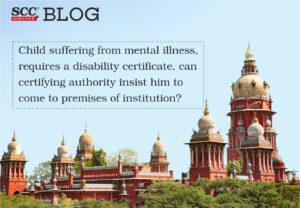Madras High Court: G.R. Swaminathan, J., held that the persons suffering from mental retardation or mental illness are entitled to have the assessment done at the place where they reside.
Factual Background
In the present matter, the petitioner was on the verge of becoming a nonagenarian and his 61 years old son, R. Saikumar was mentally retarded. Further, it was stated that the petitioner himself became a widower a couple of months back and his son-in-law died a few years ago.
The petitioner was a pensioner since November 1992 and his son would be entitled to receive the family pension benefits after his death. To avail of the said benefit, an entry will have to be made in the petitioner’s pension book.
A disability certificate was required for the above-stated, for which the petitioner’s daughter approached the Institute of Mental Health and insisted that the son be brought for assessment. It was found on the assessment that he was mentally retarded, but it was deemed insufficient for issuance of the certificate. It was insisted that Saikumar should be once again brought to the premises of the second respondent for conducting a few more tests.
Since Saikumar was traumatized by what happened on the first assessment, he developed severe anxiety and became paranoid and whenever anybody entered his home, he held on to the bars of the window. Even though the petitioner’s daughter informed the officials concerned that it was not possible to bring Saikumar for further assessment, the personnel attached to the second respondent Institute declined to pay heed to the same. That led to the filing of the present writ petition.
Question for Consideration
Whether the certifying authority can insist that the person for whom the certificate of disability is sought should come to the premises of the institution for the purpose of assessment even though he or she is unable to come?
Analysis, Law and Decision
High Court stated that, Article 41 of the Constitution of India mandates that the State shall, within the limits of its economic capacity and development, make effective provision for securing the right to public assistance in cases of sickness and disablement and in other cases of undeserved want.
Further, the Bench expressed that,
State has the obligation to design a special approach depending upon the special needs of the concerned category of disabled.
Article 14 of the Constitution of India guarantees that the State shall not deny to any person equality before the law or the equal protection of laws. But unequals cannot be treated equally. Persons with severe disabilities will have to be treated on a different footing altogether.
Question before the Court was:
Whether the applicant has to physically go to the institute for obtaining the certificate or whether the institute can depute its staff for conducting the assessment at home?
Bench expressed that,
The Government of Tamil Nadu has introduced a laudable scheme “Illam Thedi Kalvi” (Education at doorsteps). This model can very well be applied to the case on hand. Rajaji, the great statesman, mooted the idea of mobile election booths. Inverting the old phrase, I must observe that if Mohammed will not come to the mountain, the mountain must go to Mohammed.
High Court noted the need for a disabled individual to obtain identification paper and certificate of disability. Further, the Court added that it was aware of the challenges faced by the caregivers in cremating their disabled wards and children during the peak of COVID-19 because of the absence of identification papers such as Aadhaar.
“The disabled persons who are obviously entitled to rights guaranteed under Article 21 of the Constitution of India are entitled to obtain a certificate under Section 58 of the Rights of Persons with Disabilities Act, 2016 without any hassle or difficulty.”
The Bench stated that the assessment process must be as simple as possible and must not cause any difficulty or trauma or even the least burden to the concerned individual.
Court took judicial notice of the fact that bringing such persons to a congested place like the Government Hospital would trigger considerable stress and anxiety in them. One doesn’t know what can trigger anxiety and panic.
“…persons suffering from mental retardation or mental illness are entitled to have the assessment done at the place where they reside.”
Bench directed the second respondent to issue a certificate certifying that the petitioner’s son was suffering from permanent disability, hence the petition was allowed.
A Gentle Nudge:
“Any Court is expected to confine the scope of discussion as well as direction to what the facts of the particular case demand. One is not supposed to paint on a canvass larger than what is required. I had therefore consciously restrained myself to holding that the authorities shall not insist that a person suffering from mental retardation/ mental illness should be physically present in the premises of the certifying institution. But this need not stop the Government from going into the issue and issuing a standard protocol to cover cases of those who are suffering from other disabilities, particularly, motor related physical disabilities.”
Lastly, the Court remarked that, the bureaucracy of the Indian State is described as its steel frame. It must be malleable enough to reach out and address the needs of the last person. [T.R. Ramanathan v. Tamil Nadu State Mental Health Authority, WP No. 12540 of 2022, decided on 12-5-2022]
Advocates before the Court:
For Petitioner: Mr Abhinav Parthasarathy
For Respondents: Mr C. Jaya Prakash Government Advocate

